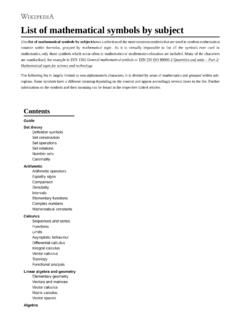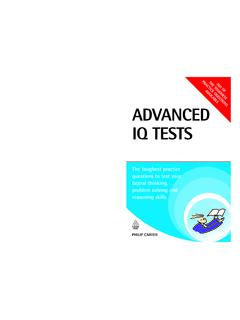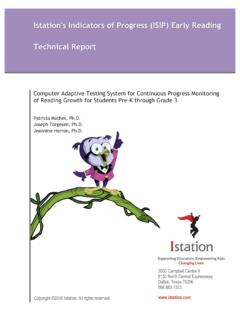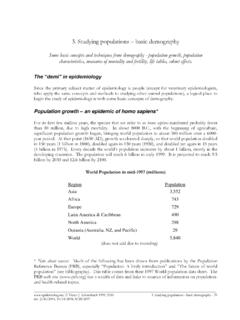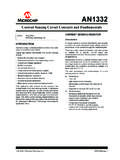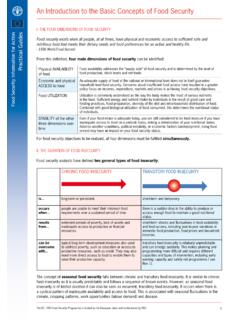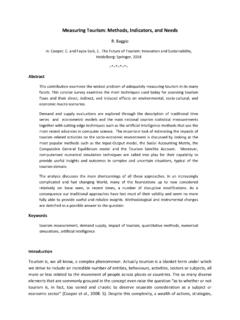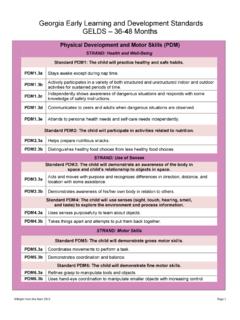Transcription of THE KNOWLEDGE-BASED ECONOMY - Basic Knowledge 101
1 GENERAL DISTRIBUTIONOCDE/GD(96)102 THE KNOWLEDGE-BASED ECONOMYORGANISATION FOR ECONOMIC CO-OPERATION AND DEVELOPMENTP aris 19962 Copyright OECD, 1996 Applications for permission to reproduce or translate all or part of this material shouldbe made to:Head of Publications Service, OECD, 2 rue Andr Pascal, 75775 Paris, Cedex 16, OECD economies are increasingly based on Knowledge and information. Knowledge is nowrecognised as the driver of productivity and economic growth, leading to a new focus on the role ofinformation, technology and learning in economic performance. The term Knowledge -basedeconomy stems from this fuller recognition of the place of Knowledge and technology in modernOECD analysis is increasingly directed to understanding the dynamics of the Knowledge -basedeconomy and its relationship to traditional economics, as reflected in new growth theory.
2 Thegrowing codification of Knowledge and its transmission through communications and computernetworks has led to the emerging information society . The need for workers to acquire a range ofskills and to continuously adapt these skills underlies the learning ECONOMY . The importance ofknowledge and technology diffusion requires better understanding of Knowledge networks and national innovation systems . Most importantly, new issues and questions are being raised regardingthe implications of the KNOWLEDGE-BASED ECONOMY for employment and the role of governments in thedevelopment and maintenance of the Knowledge best practices for the KNOWLEDGE-BASED ECONOMY is a focal point of OECD work inthe field of science, technology and industry.
3 This report discusses trends in the Knowledge -basedeconomy, the role of the science system and the development of KNOWLEDGE-BASED indicators andstatistics. It is excerpted from the 1996 Science, Technology and Industry Outlook, which isderestricted on the responsibility of the Secretary-General of the OF CONTENTSSUMMARY .. 7I. THE KNOWLEDGE-BASED ECONOMY : TRENDS AND 9A. 9B. Knowledge and Knowledge Knowledge and Knowledge Knowledge and employment ..16G. Government THE ROLE OF THE SCIENCE SYSTEM IN THE KNOWLEDGE-BASED Knowledge Knowledge Knowledge Government INDICATORS FOR THE KNOWLEDGE-BASED Measuring Measuring Knowledge inputs.
4 31D. Measuring Knowledge stocks and Measuring Knowledge Measuring Knowledge Measuring Knowledge and science, technology and industry policies should be formulated to maximise performanceand well-being in KNOWLEDGE-BASED economies economies which are directly based on theproduction, distribution and use of Knowledge and information. This is reflected in the trend inOECD economies towards growth in high-technology investments, high-technology industries, morehighly-skilled labour and associated productivity gains. Although Knowledge has long been animportant factor in economic growth, economists are now exploring ways to incorporate more directlyknowledge and technology in their theories and models.
5 New growth theory reflects the attempt tounderstand the role of Knowledge and technology in driving productivity and economic growth. Inthis view, investments in research and development, education and training and new managerial workstructures are addition to Knowledge investments, Knowledge distribution through formal and informalnetworks is essential to economic performance. Knowledge is increasingly being codified andtransmitted through computer and communications networks in the emerging information society .Also required is tacit Knowledge , including the skills to use and adapt codified Knowledge , whichunderlines the importance of continuous learning by individuals and firms.
6 In the Knowledge -basedeconomy, innovation is driven by the interaction of producers and users in the exchange of bothcodified and tacit Knowledge ; this interactive model has replaced the traditional linear model ofinnovation. The configuration of national innovation systems, which consist of the flows andrelationships among industry, government and academia in the development of science andtechnology, is an important economic in the KNOWLEDGE-BASED ECONOMY is characterised by increasing demand for morehighly-skilled workers. The Knowledge -intensive and high-technology parts of OECD economiestend to be the most dynamic in terms of output and employment growth.
7 Changes in technology, andparticularly the advent of information technologies, are making educated and skilled labour morevaluable, and unskilled labour less so. Government policies will need more stress on upgradinghuman capital through promoting access to a range of skills, and especially the capacity to learn;enhancing the Knowledge distribution power of the ECONOMY through collaborative networks and thediffusion of technology; and providing the enabling conditions for organisational change at the firmlevel to maximise the benefits of technology for science system, essentially public research laboratories and institutes of higher education,carries out key functions in the KNOWLEDGE-BASED ECONOMY , including Knowledge production,transmission and transfer.
8 But the OECD science system is facing the challenge of reconciling itstraditional functions of producing new Knowledge through Basic research and educating newgenerations of scientists and engineers with its newer role of collaborating with industry in thetransfer of Knowledge and technology. Research institutes and academia increasingly have industrialpartners for financial as well as innovative purposes, but must combine this with their essential role inmore generic research and general, our understanding of what is happening in the KNOWLEDGE-BASED ECONOMY isconstrained by the extent and quality of the available Knowledge -related indicators.
9 Traditionalnational accounts frameworks are not offering convincing explanations of trends in economic growth,productivity and employment. Development of indicators of the KNOWLEDGE-BASED ECONOMY muststart with improvements to more traditional input indicators of R&D expenditures and researchpersonnel. Better indicators are also needed of Knowledge stocks and flows, particularly relating tothe diffusion of information technologies, in both manufacturing and service sectors; social andprivate rates of return to Knowledge investments to better gauge the impact of technology onproductivity and growth; the functioning of Knowledge networks and national innovation systems;and the development and skilling of human THE KNOWLEDGE-BASED ECONOMY : TRENDS AND term KNOWLEDGE-BASED ECONOMY results from a fuller recognition of the role of knowledgeand technology in economic growth.
10 Knowledge , as embodied in human beings (as human capital )and in technology, has always been central to economic development. But only over the last fewyears has its relative importance been recognised, just as that importance is growing. The OECD economies are more strongly dependent on the production, distribution and use of Knowledge thanever before. Output and employment are expanding fastest in high-technology industries, such ascomputers, electronics and aerospace. In the past decade, the high-technology share of OECD manufacturing production (Table 1) and exports (Figure 1) has more than doubled, to reach 20-25 percent.
